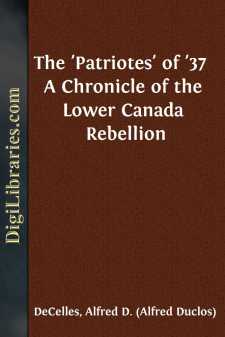Categories
- Antiques & Collectibles 13
- Architecture 36
- Art 48
- Bibles 22
- Biography & Autobiography 813
- Body, Mind & Spirit 142
- Business & Economics 28
- Children's Books 15
- Children's Fiction 12
- Computers 4
- Cooking 94
- Crafts & Hobbies 4
- Drama 346
- Education 46
- Family & Relationships 57
- Fiction 11829
- Games 19
- Gardening 17
- Health & Fitness 34
- History 1377
- House & Home 1
- Humor 147
- Juvenile Fiction 1873
- Juvenile Nonfiction 202
- Language Arts & Disciplines 88
- Law 16
- Literary Collections 686
- Literary Criticism 179
- Mathematics 13
- Medical 41
- Music 40
- Nature 179
- Non-Classifiable 1768
- Performing Arts 7
- Periodicals 1453
- Philosophy 64
- Photography 2
- Poetry 896
- Political Science 203
- Psychology 42
- Reference 154
- Religion 513
- Science 126
- Self-Help 84
- Social Science 81
- Sports & Recreation 34
- Study Aids 3
- Technology & Engineering 59
- Transportation 23
- Travel 463
- True Crime 29
The 'Patriotes' of '37 A Chronicle of the Lower Canada Rebellion
Description:
Excerpt
CANADIANS, OLD AND NEW
The conquest of Canada by British arms in the Seven Years' War gave rise to a situation in the colony which was fraught with tragic possibilities. It placed the French inhabitants under the sway of an alien race—a race of another language, of another religion, of other laws, and which differed from them profoundly in temperament and political outlook. Elsewhere—in Ireland, in Poland, and in the Balkans—such conquests have been followed by centuries of bitter racial warfare. In Canada, however, for a hundred and fifty years French Canadians and English Canadians have, on the whole, dwelt together in peace and amity. Only on the one occasion, of which the story is to be told in these pages, has there been anything resembling civil war between the two races; and this unhappy outbreak was neither widespread nor prolonged. The record is one which Canadians, whether they be English or French, have reason to view with satisfaction.
It does not appear that the Canadians of 1760 felt any profound regret at the change from French to British rule. So corrupt and oppressive had been the administration of Bigot, in the last days of the Old Regime, that the rough-and-ready rule of the British army officers doubtless seemed benignant in comparison. Comparatively few Canadians left the country, although they were afforded facilities for so doing. One evidence of good feeling between the victors and the vanquished is found in the marriages which were celebrated between Canadian women and some of the disbanded Highland soldiers. Traces of these unions are found at the present day, in the province of Quebec, in a few Scottish names of habitants who cannot speak English.
When the American colonies broke out in revolution in 1775, the Continental Congress thought to induce the French Canadians to join hands with them. But the conciliatory policy of the successive governors Murray and Carleton, and the concessions granted by the Quebec Act of the year before, had borne fruit; and when the American leaders Arnold and Montgomery invaded Canada, the great majority of the habitants remained at least passively loyal. A few hundred of them may have joined the invaders, but a much larger number enlisted under Carleton. The clergy, the seigneurs, and the professional classes—lawyers and physicians and notaries—remained firm in their allegiance to Great Britain; while the mass of the people resisted the eloquent appeals of Congress, represented by its emissaries Franklin, Chase, and Carroll, and even those of the distinguished Frenchmen, Lafayette and Count d'Estaing, who strongly urged them to join the rebels. Nor should it be forgotten that at the siege of Quebec by Arnold the Canadian officers Colonel Dupré and Captains Dambourgès, Dumas, and Marcoux, with many others, were among Carleton's most trusted and efficient aides in driving back the invading Americans. True, in 1781, Sir Frederick Haldimand, then governor of Canada, wrote that although the clergy had been firmly loyal in 1775 and had exerted their powerful influence in favour of Great Britain, they had since then changed their opinions and were no longer to be relied upon....


